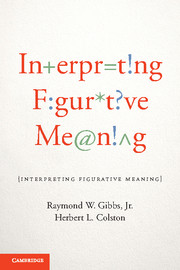Book contents
- Frontmatter
- Contents
- 1 Introduction
- 2 Identifying Figurative Language
- 3 Models of Figurative Language Comprehension
- 4 Interpreting Specific Figures of Speech
- 5 Indeterminacy in Figurative Language Experience
- 6 Factors Shaping Figurative Meaning Interpretation
- 7 Broadening the Scope of Figurative Language Studies
- References
- Index
7 - Broadening the Scope of Figurative Language Studies
Published online by Cambridge University Press: 05 June 2012
- Frontmatter
- Contents
- 1 Introduction
- 2 Identifying Figurative Language
- 3 Models of Figurative Language Comprehension
- 4 Interpreting Specific Figures of Speech
- 5 Indeterminacy in Figurative Language Experience
- 6 Factors Shaping Figurative Meaning Interpretation
- 7 Broadening the Scope of Figurative Language Studies
- References
- Index
Summary
The empirical study of figurative meaning use and interpretation has become a major industry within the multidisciplinary world of cognitive science. Drawing clear conclusions about the psychology of interpreting figurative meaning is quite difficult given the incredible diversity of experimental research. We have described much of the experimental research from over the past 15 years on many aspects of figurative meaning understanding and experience. Our extensive review, however, still does not adequately capture the tremendous complexities in different disciplinary and interdisciplinary literatures. Following our earlier writings (Gibbs, 1994; Gibbs & Colston, 2007), we agree that there is accumulating evidence that figurative language often reflects people's figurative conceptions of experience. There are also many empirical findings on both the prominence of figurative language in spoken and written discourse and the easy facility that people often have in using and interpreting figurative meanings. Empirical studies have also demonstrated the extensive degree to which different figures of speech convey complex cognitive, social, and affective messages.
Our review of the vast literature also reveals significant disagreements on a range of topics related to the processing and products of figurative meanings. One of the most enduring impressions we have of reading the experimental literature is how challenging it has become for individual scholars and research teams to explain their empirical results. This situation partly arises from the increasing sophistication, and complexity, of both research designs and experimental findings within and across research publications. Reading the discussion sections of most research articles on figurative language in psycholinguistics and neuroscience demonstrates the incredible struggle authors have in trying to articulate consistent theoretical conclusions given the variations in their data and reconciling one's own findings with the mass of data already in the literature.
- Type
- Chapter
- Information
- Interpreting Figurative Meaning , pp. 327 - 344Publisher: Cambridge University PressPrint publication year: 2012



